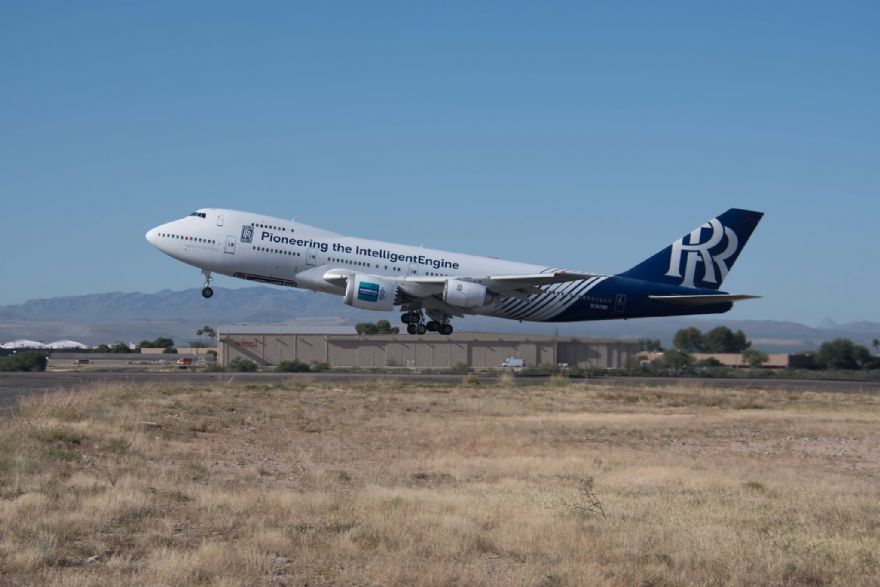 Rolls-Royce
Rolls-Royce, working with
Boeing and
World Energy, recently carried out a successful test flight of its 747 Flying Testbed aircraft using 100% Sustainable Aviation Fuel (SAF) on a Trent 1000 engine.
The aircraft flew from Tucson airport in Arizona, passing over New Mexico and Texas, with a Trent 1000 engine running solely on 100% SAF while the remaining three RB211 engines ran on standard jet fuel, arriving back at the airport 3hr 54min later. Initial indications confirm there were no engineering issues, providing further proof of the fuel’s suitability for commercial use.
Rolls-Royce has continued to pioneer the adoption of 100% SAF, and validation of this test adds to those already carried out on its Trent XWB and Pearl engines, both on the ground and in the air. Last week it confirmed that all of its Trent engines will be compatible with 100% SAF by 2023 and also called for further ambition and collaboration across the aviation sector, and with governments, to enable the transition of long-haul aviation towards Net Zero ahead of aviation goals set by the UN Race to Zero.
Aircraft are currently only certified to operate on a maximum of 50% SAF blended with conventional jet fuel and Rolls-Royce continues to support efforts to certificate non-blended SAF. This is particularly important to support sustainability in long-distance air travel, which will require the power density of gas turbines for years to come.
The flight was carried out in close collaboration with Boeing, which provided technical support and oversight on aircraft modifications and assurance the aircraft systems would operate as expected with 100% SAF. US-based World Energy, a commercial-scale SAF production company, provided the low-carbon fuel for the flight.
The need to significantly increase the production of SAF was recognised recently by the US Biden administration with the launch of a Sustainable Aviation Fuel Grand Challenge to produce three billion gallons of the fuel a year by 2030.
This will form part of a wider aviation climate action plan to be released in the coming months. The European Commission has also created a ReFuelEU Aviation proposal that would mandate the incorporation of SAF supplied at EU airports. This would increase to 63% by 2050.
Simon Burr, Rolls-Royce director product development and technology (civil aerospace), said: “We believe in air travel as a force for cultural good, but we also recognise the need to take action to decarbonise our industry. This flight is another example of collaboration across the value chain to make sure all the aircraft technology solutions are in place to enable a smooth introduction of 100% SAF into our industry.”
Sheila Remes, vice president of environmental sustainability at Boeing, said: “It is an honour to partner with Rolls-Royce and World Energy on this 100% SAF flight. Its success further illustrates that SAF can fully replace conventional jet fuel over the long term and is a viable renewable energy solution to decarbonise aviation over the next 20-30 years.”
Gene Gebolys, World Energy CEO, said: “As the world’s first and the USA’s only SAF producer, we are grateful for the trailblazing work our partners are doing. Rolls-Royce’s work to prove the viability of powering the jet engines they make with the 100% renewable SAF we make lays the groundwork for fossil fuel-free flight. This work is incredibly important, and we applaud and appreciate Rolls-Royce for working with us to do it.”
The Rolls-Royce Flying Testbed is used to carry out a variety of engine-related tests that improve efficiency and durability, as well as support our decarbonisation strategy.